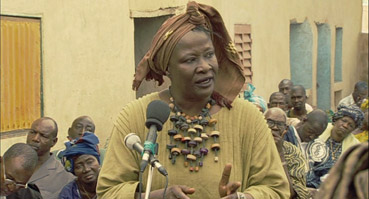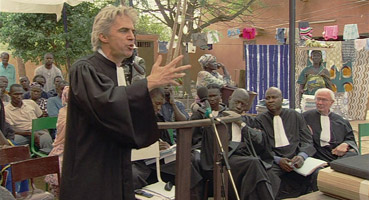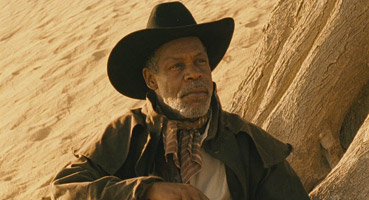|
If you've not been following the involvement
of the International Monetary Fund and the World Bank in
the failing fortunes of the many countries that make up
the African content, then I'd certainly advise you to do
so. It's a grim story of exploitation and almost criminal
economic advantage-taking wrapped in the deceptively friendly
glove of financial support. Loans were granted to the world's
poorest nations by the richest, but with the sort of strings
attached that seem designed to exploit the recipients as
a source of cheap labour and goods, with forced privatisation
paving the way for foreign multinationals to undercut local
businesses with their own subsidised imports. If this were
not enough, many of the countries have had to spend
a far larger portion of their GNP on loan repayments than
on health care, which has been cited as a key contributor
to the continent's AIDS explosion. It's this socio-economic
issue that's at the heart of Abderrahmane Sissako's Bamako,
an unusual but elegantly handled blend of evidenced fact and drama.
In
the Mali capital of Bamako, the relationship between bar
room singer Melé (Aïssa Maïga) and her
unemployed husband Chaka (Tiécoura Traoré)
has become strained. As the pair go about their daily life,
barely communicating with each other, the courtyard of their
house becomes host to legal proceedings in which the International
Monetary Fund and the World Bank are being prosecuted for
the harm their policies have inflicted on Africa, with witnesses
called to give evidence and answer interrogation from both
councils.

Now on paper I have no doubt that this sounds worthy but
cinematically a little dreary and even monotonous, and even
as someone who strongly supports the views being expressed
here I went in wondering whether this could actually work
as cinema. But from its earliest moments there is a gentle
poetry to the handling, and it soon becomes evident that
Bamako is going to be much more than a
platform for political rhetoric. The trial itself is slow
to get under way and at first appears to be taking place
on a different plane of existence to the everyday activities
that surround it. The locals indifferently go about their
business and although the proceedings are being conducted
in her own courtyard, Melé walks through it and the
assembled group without either party acknowledging the presence
of the other. Only the man guarding the entrance to the
yard appears to be initially aware of both worlds, greeting
Melé as she leaves and controlling access to the
court. He warns a camcorder-wielding reporter that no filming
is allowed, but professional cameras and mike booms are
openly in attendance – it's never certain whether these
are the instruments of a televised broadcast or Sissako's
own crew, revealed in a further peeling back of film reality.
Such
structural game-playing is always more than surface surrealism
and is clearly designed as a commentary on the relationship
that the average citizen has with decisions of state and
international politics. Initially unresponsive to the proceedings,
the townspeople begin to pay more attention when the arguments
heat up and the stories become more personal. But it doesn't
last. Indifference once again sets in, and the loudspeakers
over which the trial is being broadcast are disconnected by locals so that conversations
about more trivial matters can continue undisturbed.
The
location of the hearing also has an equalising effect, rightly
suggesting that the lives of ordinary citizens are as significant
and worthy of our attention as the debates of the even highest
court, something the judge here acknowledges with the announcement
that there will be "an adjournment for social realities"
to let a wedding party pass through. The quietly deteriorating
relationship between Melé and Chaka also has its
allegorical aspect, and even the most offhand moments can
double as social commentary: the unhelpful imported religions;
the reporter who bribes the gate keeper to gain access to
the trial; the man who is learning Hebrew to be a guard
at an Israeli embassy that there are no current plans to
build; the well-to-do defence attorney who demands to see
the logo that proves the sunglasses he is buying from a
street vendor are genuine Gucci.

At
the core, of course, is the case against the IMF and the
World Bank, which is passionately and persuasively made,
the dramatic structure of the film allowing an anger that
might feel overly didactic in a straight documentary. The
facts and figures presented are damning in themselves and
the indignation of the witnesses clearly comes from the
heart – unlike the main players and even many of the background
characters, they are clearly not professional actors but
Malian citizens with experience-formed views and their own
stories to tell. The case is intelligently and forcefully
argued by council and witnesses alike, but somehow the most
powerfully affecting moment is also the least specific,
as an old man sings in a voice filled with a sadness and
anger, in a dialect that neither we nor the court members
understand (there are no subtitles for this sequence), but
whose effect is to move us as profoundly as it does the
assembled group.
Bamako
is impassioned but well argued political cinema that also
succeeds in artistic and dramatic terms. It's typical of
the best recent African cinema in that it grips without ever
feeling the need to hurry and makes even its most inspired
moments seem unforced. Only the mid-film American Western
parody, complete with title and credits and starring co-executive
producer Danny Glover and directors Elia Suleiman, Zeka
Laplaine, Jean-Henri Roger and Sissako himself, feels a
little heavy-handed in its allegory. But in all other aspects
Bamako strikes a most effective balance
between subtle suggestion and direct confrontation, with
the anger of the witnesses and prosecutors both understandable
and appropriate. If you are familiar with the politics of
African poverty then Bamako still has plenty
to offer in its drama, its focus on the detail of everyday
lives, and its infectious sense of international solidarity.
If, on the other hand, you are looking to expand your understanding
of an issue that despite affecting an entire continent just
never seems to make the headlines, then this is a solid
and heartfelt place to start.
Framed
1.85:1 and anamorphically enhanced, this is a fine transfer
whose sharpness is free of obvious edge enhancement and
whose colours, which are vivid when they need to be (fabric
drying is a prominent background activity), are bright but
natural and do not feel artificially saturated. Even at
night the detail is clearly visible and the blacks here
are absolutely solid. Whether Bamako was
shot on film or Hi-Def I've been unable to confirm, but
the latter would account for the rare white-outs on the
some brighter spots in some shots. The occasional hazy look
is due to a combination of light, dust and insects and was
also that way on the film print.

Both
Dolby 2.0 stereo and 5.1 surround are available but there's
little to choose between them. Both offer clear, full bodied
reproduction of dialogue – there's not much in the way of
incidental music and the sound effects, with one deliberately
jarring exception, are largely consigned to the background.
The song sung by Melé that bookends the film sounds
particularly good on both tracks.
Interview
with Abderrahmane Sissako (35:41)
Becoming a standard but always welcome feature of Artificial
Eye discs is a half-hour interview with the director, and
this one with Abderrahmane Sissako covers some typically
useful ground, including Sissako's early life and film education
at the Soviet Union at the Gerasimov Institute of Cinematography,
at which Sergei Eisenstein and Vsevolod Pudovkin once taught
and whose previous students include Sergei Bondarchuk, Andrei
Tarkovsky and Aleksandr Sokurov. He also discusses the film's
structure, intentions and casting, the western sequence
and the difficulty in distributing the film on home turf.
Interview
with Danny Glover (7:37)
The Hollywood actor and co-executive producer of this film
talks about working with a director he greatly admires,
and becomes infectiously passionate about the issues the
film confronts.
Christian
Aid Promotional Film (3:08)
Pete Postlethwaite, Adjoa Andoh and Ronan Keating outline
the problems created for poor countries by IMF and World
Bank in a level-headed appeal for action.
Trailer
(1:19)
A good sell that nonetheless suggests a faster paced film
than you get.
Stills
Gallery (1:31)
A rolling gallery of film stills displayed within the angled
framework of the menu design and of little real interest
when you have the feature to look at.
Director's
Statement
A textual feature in which Abderrahmane Sissako outlines
the political situation that provided his motivations for
making the film.
There's
also a brief Abderrahmane Sissako Filmography.
A
bold and effective approach to political filmmaking that
is nevertheless unlikely to work for everybody – we lost
one patron from our cinema screening just half-an-hour in.
But it deserves to be seen and its message appreciated,
understood and, in an ideal world, acted on. There are a
number of sites where you can find more information on the
issues raised in the film: The Africa
Action and Global
Issues sites should get you started.
Another
fine DVD from Artificial Eye that compliments the film with
a very reasonable package of extra features.
|